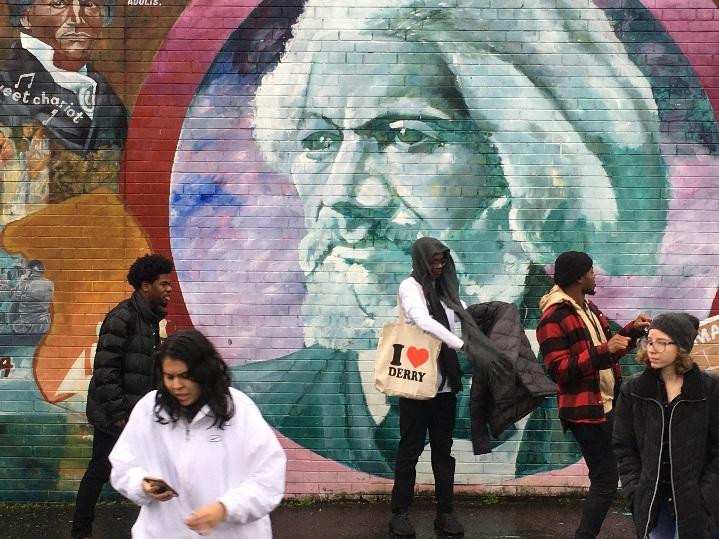Students from Morehouse College traveled to Ireland this January to study conflict resolution and social justice leadership. This J(ustice)-mester study abroad course – “Transatlantic Perspectives on Civil Rights” – was taught by Dr. Kipton Jensen as well as Dr. Niamh Hamill, who directs International Study Abroad-Ireland, and Dr. Jonathan Golden, who teaches conflict resolution at Drew University.
Drawing comparisons between the civil rights movement in the United States and the struggle that occurred in Ireland, students from Morehouse and Drew traveled from Dublin to Donegal and Derry to Belfast. The philosophy of active yet nonviolent resistance practiced by Martin Luther King, Jr. in the United States was most certainly influential on the trajectory of the civil rights movement in Ireland, whether in terms of the methods of civil disobedience or the songs of protest, e.g., “we shall overcome,” but the influence of the longer civil rights movement in the United States on Ireland is also important. The most famous of the early African American abolitionists, Frederick Douglass, who was sometimes hailed as the “Black O’Connell,” visited Ireland in 1845. Douglass met Daniel O’Connell, the so-called “Liberator,” in 1846.
The mind works by way of analogies and metaphors. We understand one thing or phenomenon, something lesser known, in relationship to things or phenomena which are better known to us. (The success of an analogy, though, thought David Hume, depends on how similar the analogues are to one another: the circulatory system of an oak tree is only weakly useful when analyzing the circulatory system of mammals.) Beyond knowledge, or maybe as a variation on cognition, humans have a capacity for empathy. What analogies can we draw, legitimately, between personal or collective struggles for liberation in one context and another one? Without wishing to encourage what some might construe as comparative victimology, e.g., trying to compare the suffering of Jews in Nazi Germany or African slaves in America or an Irish Catholic under the sword of Oliver Cromwell, something does seem to be gained by comparing and contrasting the civil rights movement if not also the peace process in Ireland and America. Maybe there’s some semblance of solidary among individuals with their collective backs against the proverbial wall.
During our time in Ireland, students were regaled on the ancient and medieval as well as troubled times that preceded the so-called “troubles” in Ireland. It is undeniable that Irish history is fraught with foreign conquest or imperialism as well as systemic discrimination and cultural appropriation. During the time of the “troubles,” i.e., between 1966 and 2006, there were not less than 3,720 deaths, 16,209 bombings, 36,923 shootings, and 47,541 people injured. Although we discussed and read about Frederick Douglass’s extended stay in Ireland, back in 1845 and 1846, it must be said that Douglass was himself quite wary if not weary—by the time he lived in Belfast—of drawing the comparison between the American situation what was going on at that time, just prior to the “great famine,” in Ireland.
In his recent biography of Douglass, David Blight writes:
[Douglass] aggressively thwarted claims for what might be called the Irish analogy—that the oppression and poverty of the Irish was equivalent to American slavery. Since beginning his tour [in Ireland] he had felt ‘accosted,’ Douglass claimed, with the idea that many of the Irish lived as ‘slaves.’ He acknowledged the tyranny of British rule, but asked for careful distinctions about ‘what slavery really is.’ Mincing no words, Douglass argued that ‘slavery is not what took away any one right or property in man: it took man himself,’ and ‘from himself, deems him a degraded thing, ranks him with the bridled horse and muzzled ox, makes him a chattel personal, a marketable commodity.’ . . . By 1850 back in the United States, he was quite direct: ‘There is no analogy between the two cases. The Irishman is poor, but he is not a slave. He may be in rags, but he is not a slave.’
Beyond the textbooks or lectures and conventional classroom, students from Morehouse also explored the cultural heritage and natural beauty of Ireland. Activities included excursions to Boyne Valley, Lough Crew Gardens, the O’Donnell Castle and Abbey in Donegal, famine sites in Ballyshannon, the Enniskillen Castle, and Free Derry. The men of Morehouse also found the time and courage to go surfing! Students from Morehouse and Drew University received special lectures on Douglass’s excursion to Ireland in Dublin from Don Mullan, who wrote the introduction to the most recent Irish edition of Frederick Douglass’ Narrative, and on the Peace Process from Rev. Harold Goode, who participated in the decommissioning of the Irish Republican Army, which was part of the Good Friday agreement in 1998, in Belfast. Students also met representatives from the Department of Foreign Affairs Northern Ireland on January 11th, the day that Northern Ireland’s power-sharing institutions were restored. Men of Morehouse are well-spoken and well-dressed, most certainly, as well as well-read and well-balanced, but they are also—and increasingly—well-traveled.
_____
Kipton E. Jensen is an associate professor of philosophy and the director of the Leadership Studies Program in the Andrew Young Center for Global Leadership at Morehouse College. His most recent books are Howard Thurman: Sermons on the Parables (Orbis Books, 2018) and Howard Thurman: Philosophy, Civil Rights, and the Search for Common Ground (University of South Carolina Press, 2019).

Tag(s):
Morehouse Faculty